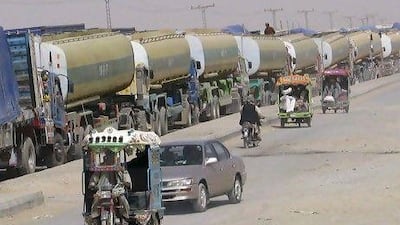Pakistan's south-western province of Balochistan, which shares long borders with Iran and Afghanistan, is the key area for strategic gas pipeline projects from energy-rich Iran, the Middle East or Central Asia to energy-hungry south and west Asia.
Conflict in Balochistan, which appears to be the result of Baloch insurgency against federal authorities in Islamabad, is not without its geopolitical implications. Unrest in Balochistan and the anti-Iran activities of Jundallah, a militant group that is believed to be based in Balochistan, make the Iran-Pakistan gas pipeline project a risky venture. Similarly, the proposed Turkmenistan-Afghanistan-Pakistan-India gas pipeline will have to pass through turbulent regions not only in Afghanistan but also in Balochistan.
Pakistan plans to construct about 780km of pipeline from its border with Iran, running along the Makran Coastal Highway to connect with its existing gas transmission network at Nawabshah in Sindh. Almost 665km of the pipeline will pass through Balochistan, while about 115km of it will be laid in the Sindh province. Washington has strongly opposed the Iran-Pakistan pipeline project, asking Islamabad to abandon the project. India walked out of the project in 2009 after the US offered co-operation in civil nuclear energy.
Defying the US pressure, Islamabad and Tehran signed a US$7.5 billion (Dh27.54bn) agreement in Tehran on May 23 2009, finalising the deal to transfer gas from Iran to Pakistan. Exactly one week later, Iran closed its border with Pakistan after a suicide bomb attack on a mosque in Zahidan that caused 20 deaths and many injuries. Jundallah claimed responsibility for the blast.
The diplomatic tension between the two countries mounted at a time when there was no outstanding issue impeding the gas pipeline project. Under the pipeline deal, the government of Pakistan would be responsible to protect the gas pipeline in its territory. The restive Balochistan provides a haven on the frontier for Jundallah, which is fighting for the rights of the Sunni Baloch population of Sistan-Balochistan.
Jundallah has been a source of worry for Tehran. Iran accuses the US of supporting Jundallah, which claimed responsibility for twin suicide attacks on a Shiite mosque on July 15 last year in Zahidan, the provincial capital of Sistan-Balochistan that borders Pakistani Balochistan. Twenty-seven people were killed in those explosions. The Iranian government is reportedly facing domestic political opposition over the pipeline deal, which critics believe is not financially and strategically viable. The Iranian oil ministry had reportedly informed its government of the Jundallah threat to the proposed gas pipeline, the greater part of which has to pass through Balochistan where Jundallah is reported to have roots.
India has been calling the proposed gas pipeline from Iran across Pakistan a risky venture that would be difficult to finance. It has been expressing its concern over security for the pipeline which has to run across volatile areas in which other pipelines have been attacked in the past.
India has long accused Pakistan of sponsoring cross-border terrorism into Kashmir, while Pakistan accuses India of fomenting insurgency in Balochistan from Afghanistan, where India has a large diplomatic presence. India has so far provided $1.2bn in aid to build economic and social opportunities in Afghanistan since a US-led campaign ousted the Taliban regime in 2001. Washington strongly supports India's involvement in Afghanistan, while Pakistan is deeply suspicious of it. Islamabad claims that Baloch separatists are backed by India and that is fuelling unrest in Balochistan.
Before December 2005, when a military operation was undertaken by federal authorities in Islamabad for the fifth time to quell an insurgency in Balochistan, there were the provincial government, Baloch nationalist parties, tribal chiefs (Sardars) and the local population who were the major stakeholders in the province's socio-political scenario. The scenario has changed, as the province is facing an insurgency backed by the separatists, who have emerged as the major stakeholders.
The worsening security situation in Afghanistan and Balochistan has so far been the major reason for delaying any project for importing gas reserves from central Asia to south Asia.
The players in the global energy game are trying to hold stakes in the strategically located Afghanistan and Balochistan, which are the key nodes in pipeline politics in the region.
If India's interest in Afghanistan is guided by its aim of gaining influence in Balochistan, its support of Baloch separatists would make it a covert stakeholder in the ongoing conflict in Balochistan.
Balochistan can emerge as a key node to corner central Asia's mineral wealth through trans-Afghan links to world markets. Its geo-strategic location makes it the most attractive for transit traffic to the landlocked Afghanistan and the central Asian republics (CARs).
The Turkmenistan-Afghanistan-Pakistan-India pipeline project is expected to open up central Asia's vast natural gas reserves to the wider world for the first time. The objective of the project will be achieved if political stability returns to Afghanistan. Balochistan would emerge as the frontline province in transportation of Caspian mineral wealth to the wider world.
Balochistan has suffered decades of neglect that intensified the feeling of alienation among local people. Baloch nationalists are fighting for their political and economic rights as enshrined in the 1973 constitution of Pakistan. The separatists are struggling for independence of Balochistan, hence they are involved in attacking the security forces, public servants, public installations and innocent citizens.
A transnational gas pipeline could turn the province into an important energy conduit in the region. The authorities in Islamabad are making an effort to appease the Baloch insurgents through the announcement of financial packages, but this is one deal that might remain a pipe dream.
Syed Fazl-e-Haider is a development analyst in Pakistan

